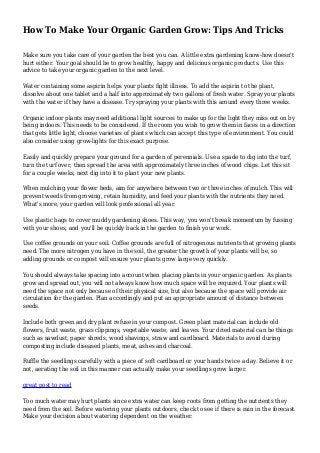
How To Make Your Organic Garden Grow: Tips And Tricks
- 1. How To Make Your Organic Garden Grow: Tips And Tricks Make sure you take care of your garden the best you can. A little extra gardening know-how doesn't hurt either. Your goal should be to grow healthy, happy and delicious organic products. Use this advice to take your organic garden to the next level. Water containing some aspirin helps your plants fight illness. To add the aspirin to the plant, dissolve about one tablet and a half into approximately two gallons of fresh water. Spray your plants with the water if they have a disease. Try spraying your plants with this around every three weeks. Organic indoor plants may need additional light sources to make up for the light they miss out on by being indoors. This needs to be considered. If the room you wish to grow them in faces in a direction that gets little light, choose varieties of plants which can accept this type of environment. You could also consider using grow-lights for this exact purpose. Easily and quickly prepare your ground for a garden of perennials. Use a spade to dig into the turf, turn the turf over, then spread the area with approximately three inches of wood chips. Let this sit for a couple weeks, next dig into it to plant your new plants. When mulching your flower beds, aim for anywhere between two or three inches of mulch. This will prevent weeds from growing, retain humidity, and feed your plants with the nutrients they need. What's more, your garden will look professional all year. Use plastic bags to cover muddy gardening shoes. This way, you won't break momentum by fussing with your shoes, and you'll be quickly back in the garden to finish your work. Use coffee grounds on your soil. Coffee grounds are full of nitrogenous nutrients that growing plants need. The more nitrogen you have in the soil, the greater the growth of your plants will be, so adding grounds or compost will ensure your plants grow large very quickly. You should always take spacing into account when placing plants in your organic garden. As plants grow and spread out, you will not always know how much space will be required. Your plants will need the space not only because of their physical size, but also because the space will provide air circulation for the garden. Plan accordingly and put an appropriate amount of distance between seeds. Include both green and dry plant refuse in your compost. Green plant material can include old flowers, fruit waste, grass clippings, vegetable waste, and leaves. Your dried material can be things such as sawdust, paper shreds, wood shavings, straw and cardboard. Materials to avoid during composting include diseased plants, meat, ashes and charcoal. Ruffle the seedlings carefully with a piece of soft cardboard or your hands twice a day. Believe it or not, aerating the soil in this manner can actually make your seedlings grow larger. great post to read Too much water may hurt plants since extra water can keep roots from getting the nutrients they need from the soil. Before watering your plants outdoors, check to see if there is rain in the forecast. Make your decision about watering dependent on the weather.
- 2. A great thing about organic foods produced by organic gardens is their lack of pesticides. While this is good for your family's health, you will want to be sure to check even more for bugs and other pests. Any type of gardening can be a fun hobby because it brings you closer to the earth, but creating an organic garden is really good at this. Organic gardening is an excellent lesson in the plant life cycle and how to get the most from the planting process. When checking out tomatoes to buy, do a bit of poking in the soil. Before buying any organic tomato seedlings to plant in your garden, you should investigate them for green starts and bad root systems. These starts can stay on the tomato seedlings for a long time, and the seedling won't start to grow until these starts have gone. If you'd like to create an organic garden of your own, it's important you learn how to build beds. You do this by slicing underneath the turf using an appropriate tool. Then, flip the dirt over and cover it with wood chips. The chips should be about 3-4 inches deep when you're done. After a few weeks, you can cut in it and plant. When you garden, be aware of what you can use. Try to use natural and organic alternatives rather than common chemical fertilizers. Using compost is a great example. By using organic substances as fertilizers, you avoid contributing to the toxic levels of contamination in soil and water that inorganic fertilizers have been blamed for causing. As you now know, the taste and quality of your produce can be greatly enhanced from utilizing the method of organic gardening. It takes research, patience and dedication, but organic gardening is well worth every bit of effort it requires.